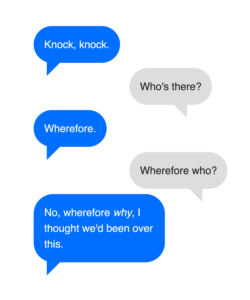Another school year draws to a close and we continue to be a Fortune’s fools as my oldest geeklet literally still hasn’t finished Romeo and Juliet yet. Amazing. She’ll be finishing the play, in theory, on her very last day of that class. She does, however, love the teacher. And she thought it would be a great idea if she brought in Shakespeare cookies for the last day of class. Because, of course, we have a Shakespeare cookie cutter. Doesn’t everybody?
But, here’s the thing. My daughter is a) a total nerd who will jump at extra credit any chance she gets, and b) painfully shy. So she’s excited about the idea and totally wants to do it, but also thinks that other kids will think that it’s lame and call her a nerd. She asks what I think.
“I think,” I tell her, “That it would be completely in character.”
“How do you mean?”
“You’re not the Shakespeare geek, and your teacher and classmates know that. You’re the girl whose dad is a Shakespeare geek. So you bring in some Shakespeare cookies and say, I made these because of course my dad is such a geek he has a Shakespeare cookie cutter. Your teacher will love it because he knows that you’re the kind of student that does extra things like that, and your fellow students love it because free cookies. Everybody knows I’m totally the kind of person that has a Shakespeare cookie cutter. I’m glad to have the opportunity to use it.”
Being the parent, though, my opinion only counts for so much. So she starts texting her friends asking whether they think it’s a good idea, or it’s lame. One of her friends writes back, “I think the teacher will love it and absolutely you should do it.” I like her. She also knows she gets cookies out of the deal.
Is that playdough they used?
So we knocked out a dozen Shakespeare cookies. It’s a big shape, and hard to transfer from work surface to baking sheet, so each one of them came out just a little bit warped. My daughter’s running commentary the entire way, performing surgery as necessary. I’m tempted to start making Earl of Oxford jokes but I know she won’t get them. So instead I say, “Make sure you let the kids know that these are Chandos cookies, and not the more well known Droeshout.”
“You say weird things,” she tells me.
“I know,” I reply. “I do that on purpose. Everybody already knows me as a geek, right? Everybody assumes that when the subject comes up I’m going to use words that people don’t know? I embrace that and run with it and make sure that’s true. It’s entertaining for me. Always be true to who you are, you end up much happier for it.”
She’s bringing them in Monday morning, which I guess is when you’ll see this post. I’ll report back with an update when I find out how they went over!

 Not taking my eyes off the road I ask, “What’s that one from?”
Not taking my eyes off the road I ask, “What’s that one from?”